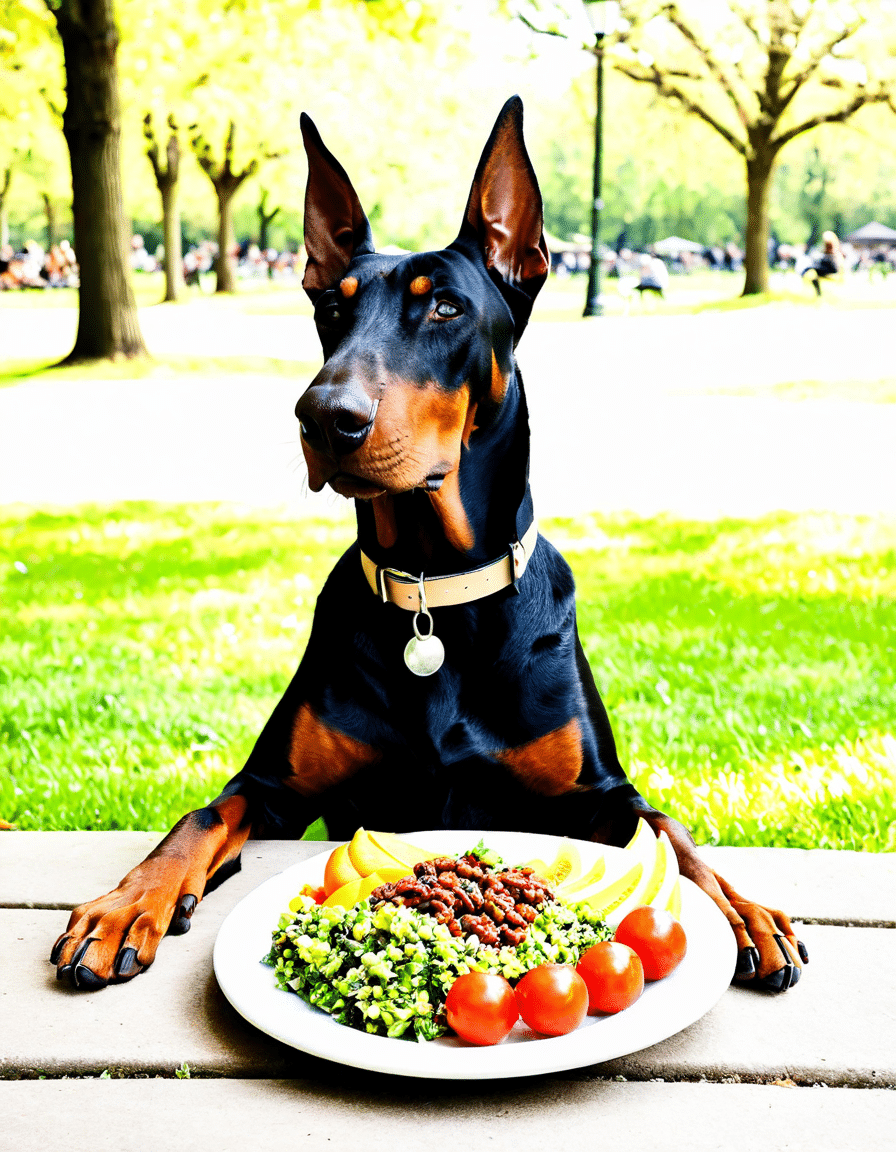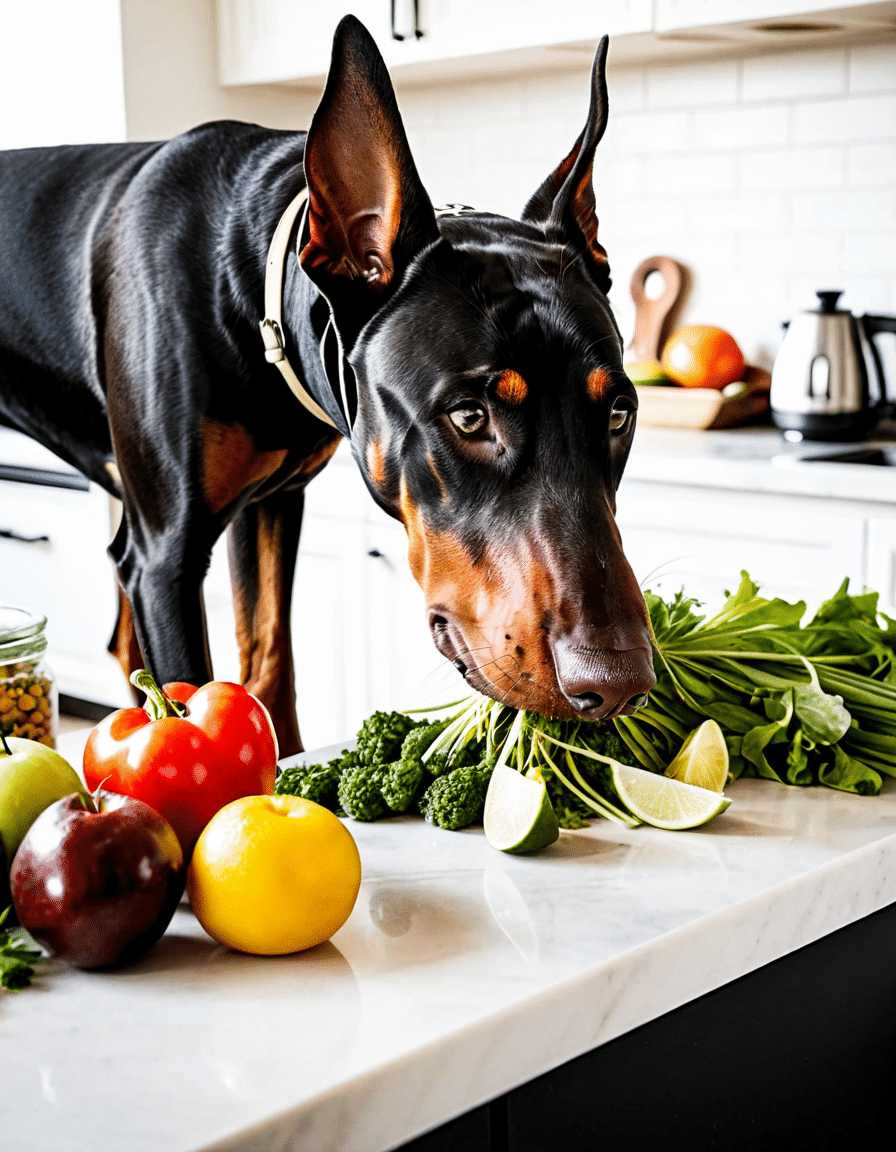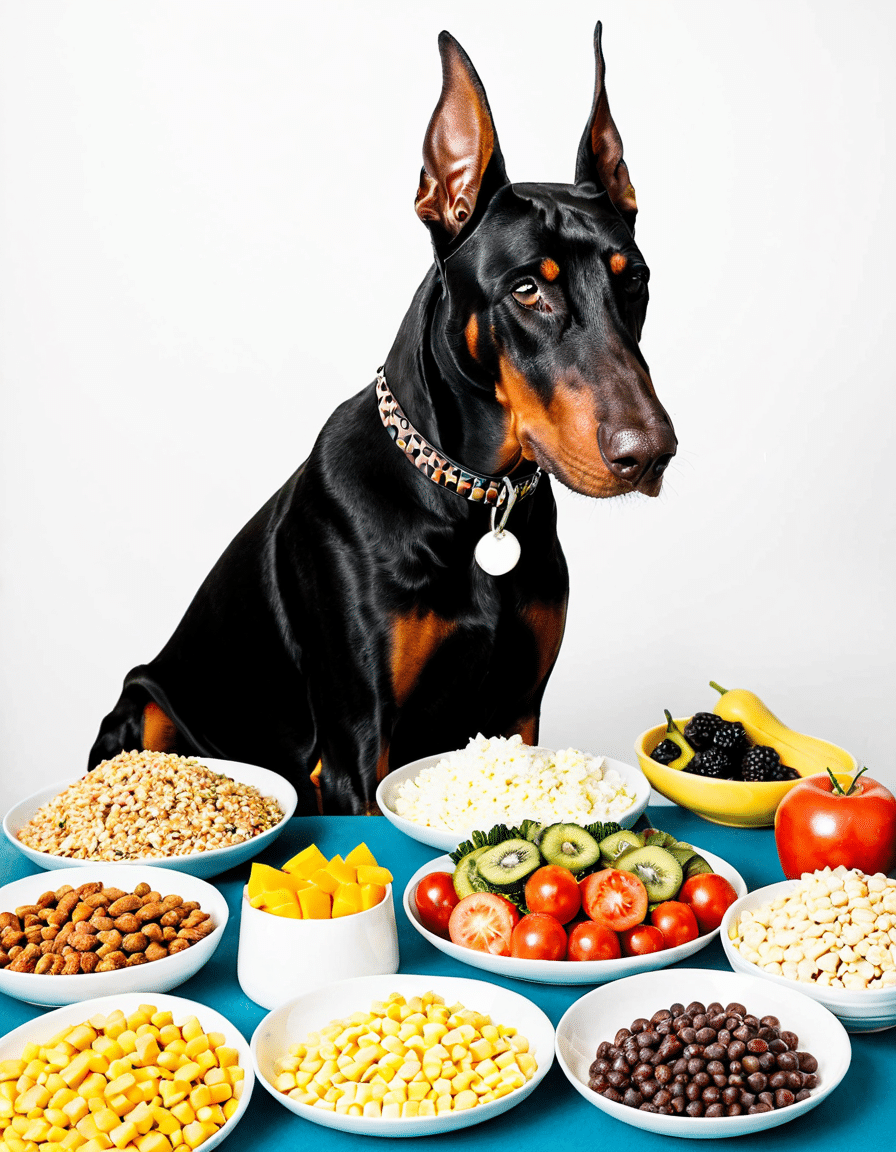Feeding a Doberman the right diet is crucial for their optimal health, longevity, and well-being. As proud companions known for their intelligence, agility, and loyalty, Dobermans thrive on a well-rounded nutritional plan. But what kind of food does a Doberman eat? This article will delve into the best types of food for your Doberman and how to maintain their health through diet.
Top 7 Food Types Ideal for Dobermans
Dobermans are active dogs that require a specific diet rich in proteins, fats, and essential nutrients to support their energetic lifestyle and muscular build. Here are seven food types that are ideal for Doberman nutrition:
1. High-Quality Dry Kibble
The cornerstone of a Doberman’s diet should be high-quality dry kibble formulated for large breed dogs. Look for brands like Orijen or Acana, which offer an impressive protein level sourced from real meat, avoiding unnecessary fillers that can harm their health. Pro tip: Always check the ingredient label; the first few ingredients should primarily be high-quality animal proteins.
2. Fresh Raw Diet
Many Doberman owners are making the switch to raw feeding, which includes fresh meats, bones, fruits, and vegetables. This diet mimics what dogs would naturally eat in the wild and is known for supporting dental health and coat quality. Consider incorporating lean meats like ground beef, chicken necks, or even sweet potatoes to their meals. It’s a big leap, but it could be worth it!
3. Canned Wet Food
Canned wet food can be an excellent source of hydration for your Doberman. Brands like Wellness and Merrick provide protein-rich options that many dogs find absolutely delicious. This can be particularly beneficial for Dobermans recovering from illness or those with picky palates. Mix it in with dry kibble for a tasty twist!
4. Grain-Free Options
Some Dobermans may have sensitivities to grains, which can lead to various digestive issues. Grain-free options from brands like Taste of the Wild or Blue Buffalo are specially crafted to provide complete nutrition without rice or corn, focusing instead on nutrient-rich legumes and sweet potatoes. Consult with your vet if you’re unsure about your dog’s grain tolerance!
5. Lean Proteins
Besides kibble and raw meals, supplementing your Doberman’s diet with lean proteins such as turkey or fish can promote strong muscle development and overall health. Rich sources like salmon are packed with omega-3 fatty acids, offering numerous health benefits, including improved coat and skin health. So go ahead, treat them to some quality protein!
6. Fruits and Vegetables
Fruits and vegetables aren’t just for humans; they provide essential vitamins and minerals for your dog as well. Carrots, blueberries, and spinach can be added to meals for extra nutrients and fiber, which contributes to better digestive health. It’s an easy way to give your Doberman a nutritious boost!
7. Supplements for Nutritional Balance
You might consider consulting with a veterinarian about incorporating supplements, especially if your Doberman shows any signs of arthritis or hip dysplasia, conditions some Dobermans are pre-disposed to. Glucosamine and omega-3 supplements can aid joint health and support overall well-being. A small addition can make a huge difference!

How Much Should a Doberman Eat?
So, just how much food does a Doberman need? When figuring this out, consider their age, weight, activity level, and overall health. On average, adult Dobermans typically require around 2 to 3 cups of high-quality food daily, divided into two meals. Puppies, however, may need to eat up to 4 cups throughout the day, divided into more frequent feedings.
Keep an eye on your Doberman’s health indicators like weight and energy levels. Adjusting the food quantity based on their individual needs can help prevent obesity—a common issue in less active breeds. Remember, a fit Doberman is a happy Doberman!
Special Considerations in Doberman Diet
Dobermans are prone to certain health issues, including dilated cardiomyopathy. Keeping an eye on their diet can help mitigate some risks associated with this condition. Ingredients like taurine and carnitine, often found in high-quality dog foods, may support heart health. Make sure to consult your veterinarian when choosing specific diets or contemplating any significant dietary changes.
Additionally, some Dobermans might suffer from food allergies or intolerances. Look out for signs like excessive itching, digestive problems, or lumps in food, which can indicate you need to change their diet. If you notice any of these symptoms, contact a vet right away to determine if dietary adjustments are necessary. You know your pup best!

Feeding Myths and Fears
Pet owners often have fears surrounding their Doberman’s diet. Many wonder, “what does lump mean in food?” Concerns about ingredient quality can naturally arise. It’s important to choose brands with transparent sourcing and processing practices, ensuring they meet your dog’s nutritional requirements effectively.
In a humorous light, you may find yourself asking, “what are the odds a funny person is traumatized?”—just a light-hearted thought on the rollercoaster ride of pet care. While feeding your Doberman is serious business, maintaining a sense of humor can make this journey more enjoyable.
Wrapping It All Up
Caring for a Doberman goes beyond simple playtime and love; it’s vital to nourish them with the best food possible to promote a vibrant, active life. Every Doberman is one-of-a-kind, requiring a personalized approach to their nutritional needs. By understanding what kind of food a Doberman eats, incorporating high-quality options, and listening to their bodies, you’ll help your formidable companion thrive for years to come.
In the quest for optimal health, don’t forget to keep your Doberman’s specific needs at the forefront. Want to know more about keeping your pet healthy? Check out our article on dog vomiting after drinking water for more insights! After all, a well-fed Doberman is a happy Doberman!
What Kind of Food Does a Doberman Eat?
When it comes to what kind of food does a Doberman eat, choosing high-quality nutrition is key for this active breed. Dobermans thrive on a diet rich in protein, healthy fats, and essential vitamins. Grains like brown rice and oats can also be beneficial for energy, but it’s vital to keep an eye on potential allergies, as these can be common in some Dobermans. Did you know that just like how Mike Tyson once had to cancel a fight because of health issues, your dog’s health can depend heavily on a proper diet too? Keeping them fit and fed right can prevent serious health problems down the line.
Protein is Paramount
Dobermans are known for their muscular build, which means they need plenty of protein to fuel their bodies. This can come from sources like chicken, beef, or fish. It’s fascinating to think that the artistry involved in training these dogs can sometimes parallel the development of iconic characters like Sephiroth from Final Fantasy, both requiring dedication and skill to get the best results. With the right food, your Doberman can thrive, ensuring they have the energy to bounce around just like the cast of The Suite Life of Zack and Cody in their whimsical escapades.
Keeping it Balanced
Another thing to consider in what kind of food does a Doberman eat is the importance of balance. This breed does best with a combination of protein, fat, and fibers, which can be achieved through commercial dog foods or homemade diets. You’ll want to avoid additives and preservatives that can do more harm than good. It’s a little like how you choose coffee Syrups; quality matters. Just as you’d opt for the best blend to whip up a delightful drink, giving your Doberman the best food is crucial to their overall health. And don’t overlook hydration; it’s as important as antifungal medication For Dogs when keeping their systems in check.
Size Matters too
Lastly, when figuring out what kind of food does a Doberman eat, consider their age and size. Puppies have different dietary needs compared to adults or seniors. With the average Doberman weighing between 60 to 100 pounds, they fall in the range of what’s commonly referred to as a 50 lb dog at Dcon tab, meaning proper portion control is essential. Just like a lab mix hound, these dogs come with their own set of nutritional requirements that evolve as they do. They need the right mix to continue flaunting their strength and agility! So, make informed decisions to help your Doberman maintain that lively spirit.



